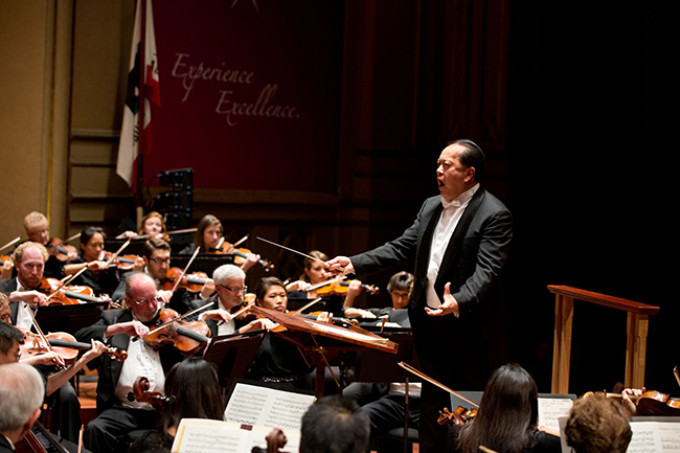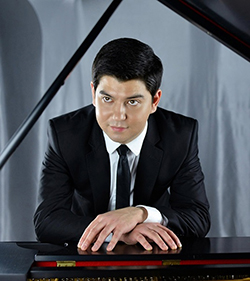Review: THE SAN DIEGO SYMPHONY CONDUCTED BY JAHJA LING at The Jacobs Music Center

It was good to see Maestro Jahja Ling return to San Diego as Conductor Laureate while we await the arrival next year of his replacement as Music Director Rafael Payare. Nor did Ling disappoint. He seemed totally absorbed in the music produced by the orchestra he was largely responsible for rebuilding. The concert opened with "Times Square: 1944" from the score of Bernstein's first Broadway show, On the Town. Ling, a Leonard Bernstein protege, bounced jauntily, swayed and nearly jitterbugged as he led the orchestra in the piece's changing moods. Freelancers alto saxophonist Mark Shannon and clarinetist Juan Gallegos added a touch of big-band jazz to nail the jazzy Broadway vibe.
The mood turned more serious with what has become known as the Rach 3, an Everest every young virtuoso would love to conquer. Not all succeed as well as guest soloist Behzod Abduraimov whose technique never faltered in this, one of the repertoire's most difficult concertos. Ling, himself an excellent pianist, was in perfect step with the soloist. After a most Russian-sounding introduction, Abduraimov entered with an unusually subdued and unassuming touch, designed perhaps to increase the contrast with the virtuosic thunder that came to a first-movement peak during an extended cadenza. Dynamics were extreme throughout the piece, occasionally aided at the higher end by an overuse of pedal. There was no denying the impact of the pianist's sheer skill as he negotiated hand-crossing runs and ridiculously difficult chords, all at blinding speed in a crowd-pleasing performance.
introduction, Abduraimov entered with an unusually subdued and unassuming touch, designed perhaps to increase the contrast with the virtuosic thunder that came to a first-movement peak during an extended cadenza. Dynamics were extreme throughout the piece, occasionally aided at the higher end by an overuse of pedal. There was no denying the impact of the pianist's sheer skill as he negotiated hand-crossing runs and ridiculously difficult chords, all at blinding speed in a crowd-pleasing performance.
Shostakovich's Fifth Symphony followed the intermission. Written, the composer said, as "A Soviet Artist's Response to Just Criticism." The criticism was from Stalin, who had just brought about the murder of over a million dissidents, including quite a few whose main crime was producing art Stalin didn't like. There have been numerous, and still continuing disagreements about the effects of the Communist regime on Russian music. When the Cold War was in full bloom many critics disparaged the works of Shostakovich and Prokofiev, believing they were complicit in tyranny. Easier to say when the worst reaction is a nasty letter to the editor, more difficult when one of your closest friends was just carted off to the Gulag or shot. Shostakovich generally gets more support for bucking Stalin than Prokofiev, and his fifth symphony is often used as an argument. In my mind there is little doubt that Shostakovich chose a mix of prudent subservience and risky satiric nose-thumbing ridicule.
Ling and the orchestra's version of the symphony reminded me of Bernstein's thrilling recording, my favorite. I was surprised at the very end, and a bit disappointed, when the one-time student of the famous composer and conductor went along with most other contemporary conductors and finished by decelerating in the final measures. The effect is a feeling of regal grandeur. Instead of slowing Bernstein doubles down to reach an even higher level of excitement. I don't know which interpretation Shostakovich would have preferred, but I'll go for excitement every time.
Photos courtesy of San Diego Symphony.
Reader Reviews

Videos
